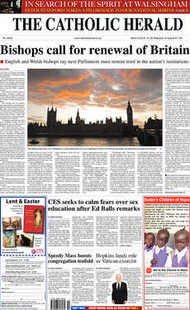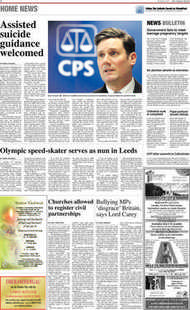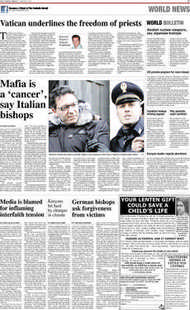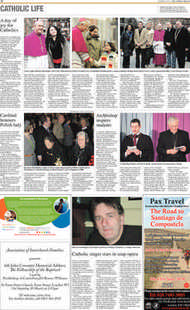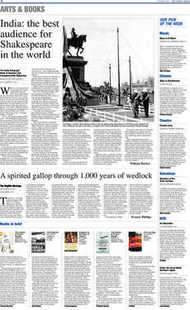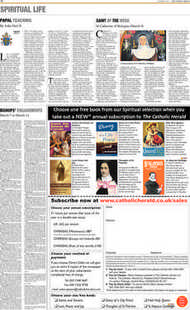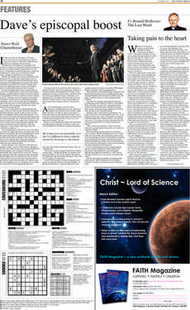Page 20, 5th March 2010
Page 20

Report an error
Noticed an error on this page?If you've noticed an error in this article please click here to report it.
Tags
Share
Related articles
Bishops Call For Renewal Of Britain
Archbishop Challenges Coalition On Marriage
Church Denies Rift Over Support For Big Society
An Insult With An Upside
Archbishop: Stable Family Life Is Key To A Stable Society
Dave’s episcopal boost
Stuart Reid Charterhouse
In their pre-election statement, Choosing the Common Good, the bishops give David Cameron a boost by implicitly supporting his policies on marriage and the family.
Whether this nod of approval will improve Mr Cameron’s chances of winning the election remains to be seen, but it does nothing to persuade me to vote Tory, or to feel that it would be other than a matter for Confession if I were to do so. (Venial or mortal? Tricky. Perhaps I should ask Fr Tim Finigan.) Besides, the bishops also express sentiments in the document that will be read as pro-Labour, and it is only to be expected that they should back just about any policy that might protect marriage. In his speech in Brighton on Sunday Mr Cameron seemed to be doing the right thing when he again committed his party to recognising marriage in the tax system.
In terms of simple justice, that is a good thing, of course, but a bung of £20 a week won’t keep couples together, and the problem with Mr Cameron is that he is an agreeable cove but it is difficult to know what he means by marriage, or for that matter by the family. Sometimes it seems that any combination of bodies and babies will do. In a key passage in his Brighton speech Mr Cameron revealed more about himself and his attitudes than he perhaps intended. It is worth quoting the passage in full: “I was on a radio phone-in in Kent the other day, and a young man rang up and said that he had got his girlfriend pregnant, and he wanted to move in with her, and together to bring up that child and give it the best start in life, but he had found out that if he moved in with his girlfriend, she would lose her benefits, and be much worse off, so he couldn’t do it. What sort of crazy country sends a signal like that to people who want to do the best for their families? That’s the change we’ve got to bring in this party, that’s the value that we aspire to.” The real question is: what sort of crazy Tory leader can send out a signal like that to the people who want the best for families? Read the paragraph again. In the first place Mr Cameron, champion of marriage, is morally neutral about marriage. In the second place, however, he suggests that young men cannot be expected to look after their girlfriends and babies unless the state subsidises them.
In Mr Cameron’s view, that man on the phone-in simply “couldn’t” give his child what he regarded as the best start in life, because, if he joined his girlfriend in that enterprise, she would lose benefits (and, presumably, they would both be worse off). There is no suggestion from Mr Cameron that the man might think it right to give his baby the best start in life by marrying the woman, even if that meant she had to give up her single mum allowance, or whatever, and he, in consequence, had to work harder. Are we really as venal as Mr Cameron apparently believes? It is not just the Tories, however. Mr Cameron is a child of his times. Like all our politicians, he believes, with Roy Jenkins, that the permissive society is just another term for the civilised society, and that civilisation means gay adoption and gay “marriage”, nonjudgmental sex education, and embryonic stem-cell research. In other words, it means moral relativism. That is not going to change whoever wins the election.
Alot of headbangers, not all of them Catholics, attended the Spectator debate on England and Catholicism on Tuesday night. When the floor was thrown open to questions, a Protestant stood up and declared that there was no priest but Christ and that the debate had been fixed. “The Protestant people of this country have not been heard tonight,” he said.
Maybe it was a Popish plot. Maybe the Jesuits had fed mind-altering substances into the air vents, and we’d all rolled over for Rome. Certainly the proceed
Mr Cameron is an agreeable cove but it is difficult to know what he means by marriage or the family
ings were odd, if only because the Catholic side won so handsomely.
The motion was that “England should be a Catholic country again”. Before the debate, the audience had divided as follows: 247 for the motion, 189 against, 226 undecided. After the debate, the figures were: 349 for, 227 against, 42 undecided.
I voted for the motion, but had not expected to be on the winning side. We were obviously helped – as the Protestant noticed – by the fact that one of the speakers against the motion, the Labour MP Stephen Pound, a Catholic, ended up speaking for it.
There had been a misunderstanding. Apparently, Mr Pound had thought that he was speaking against the idea that England should become a Catholic state. He didn’t want that, but he was all for England being Catholic.
The other two speakers against the motion were Lord Harries, former Bishop of Oxford, and Matthew Parris, the Times and Spectator columnist. For the motion were Cardinal Cormac Murphy-O’Connor, Dom Antony Sutch, the former headmaster of Downside, and the novelist Piers Paul Read.
Matthew Parris, whom I know and admire, was pretty savage but was neither strident nor rude – to his audience at any rate. “Jesus of Nazareth is a colossal embarrassment to the Catholic Church,” he said; and vice-versa. “Can anyone see Jesus looking at the Vatican and saying that that was what he had come to found?” “Yes!” shouted a headbanger. There were times when the evening began to sound like a revivalist tent meeting in Idaho.
Piers Paul Read, whom I also know and admire, was very brave. He did something many of us would rather not do in public: he courted the mockery of his peers by speaking up clearly for the Church’s teaching on sexual morality, the aspect of Catholicism most hated and derided by outsiders. He even defended the ban on artificial contraception, which is not something you often hear priests and bishops do.
It was a good-natured occasion, though, nothing like the waspish Intelligence Squared debate last November, when Stephen Fry and Christopher Hitchens persuaded the audience, by 1,862 votes to 268, that Catholicism was not a force for good in the world.
One all, then. Maybe someone will arrange some more fixtures. With a little good will on all sides, Catholics v the Rest could develop into an Olympic sport.
blog comments powered by Disqus


